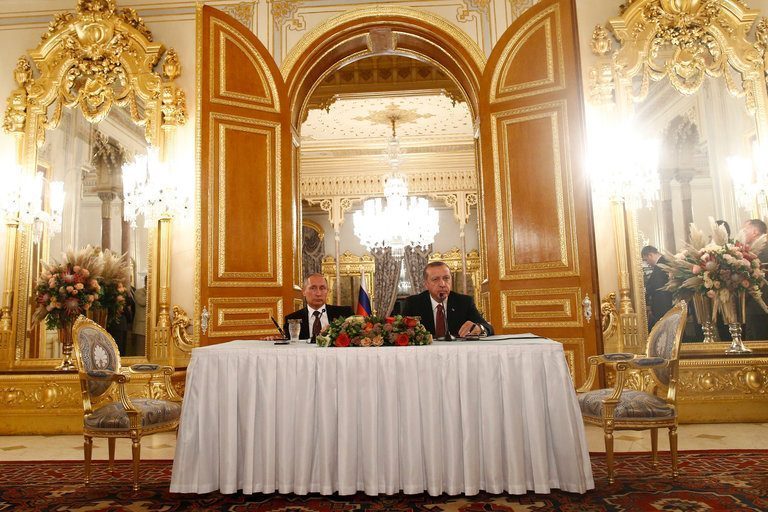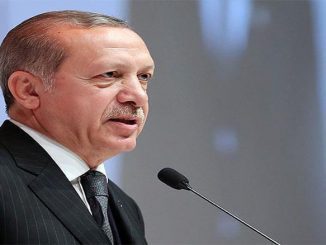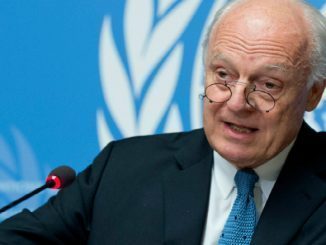
The timing of Russian President Vladimir Putin’s Visit to Turkey – from 10 to 11 Oct. 2016 – is important due to several reasons, including:
* First, the Turkish Stream: The gas pipeline is expected to run below the Black Sea from Russia to Turkey and continue to a hub on the Turkish-Greek border, where the gas could be transferred to Southern Europe. Turkey and Russia signed the strategic Turkish Stream gas pipeline agreement late on Oct. 10 amid vows by both countries to intensify their relations.
Ties to recur rapidly
Turkey’s President Recep Tayyip Erdoğan said: “I firmly believe the normalization process between Turkey and Russia will continue swiftly,” adding that negotiations over the Akkuyu Nuclear Power Plant would also continue as planned.Putin said the plant would not only be a means to generate nuclear energy but would also cover technology and training of Turkish staff.
Russia’s President Vladimir Putin said the plant would not only be a means to generate nuclear energy but would also cover technology and training of Turkish staff.
Turkish exports enter normalization process with Russia
The Russian President said: “Today, the Russian government made a decision. We are reopening many restricted Turkish exports. We will take especially citrus fruits and other fresh fruit, and vegetables and agricultural products to the Russian market. It is a decision based on mutual advantage,” adding: “Because Russian agricultural sector does not produce these types of products. When these products will be exported from Turkey to Russia, our prices will go down,”
The Turkish Prime Minister Binali Yıldırım said about Turkish Stream: The Turkish PM said: “It (the project) aims to ensure energy security in the region and providing necessary security in this issue to the neighboring countries… This project will be beneficial for Europeans.”
GAZPROM`S CEO Alexey Miller said: “The constructive, efficient cooperation with Turkish partners of the project should be noted. The Turkish Stream project is progressing at commendable speed. An important new resolution for its implementation has been obtained.`
* Second, Akkuyu Nuclear Power Plant: Akkuyu NPP project turns ınto strategıc ınvestment also ıt has ımportance for trade and economıc tıes between Turkey and Russıa. Some comment deal wıth thıs ıssue from Mınısters and CEO
Some comments on thıs ıssue from Mınısters and CEO:
Rosatom whıch is Russıa’s Goverment Energy Company said: “The two sides discussed current issues concerning the project for the construction of Turkey’s first nuclear power plant Akkuyu which is the world’s first to be implemented under the build-own-operate (BOO) scheme”
Russian Energy Minister Alexander Novak noted that: “The Turkish Stream and the Akkuyu nuclear power plant, which will be Turkey’s first, are key to further reviving of the two countries’ bilateral ties in a normalization process after the jet crisis.”
* Mr. Novak added that “Turkey is our neighbor and a partner that is important to us. Our trade volume surged to $35 billion in 2014, but it decreased almost 40 percent in the first eight months of 2016 compared to the same period of 2015 due to the diplomatic crisis … In the normalization process, energy is one of the key areas. Both the Turkish Stream and the Akkuyu power plant are crucial projects that will revive our ties.”
“If we want to boost our trade and economic ties, both of these projects need to be completed and become operational” he added. “Turkey has even made some changes in its laws to enable the construction to start immediately. As soon as the project is completed it will add value to the Turkish economy,” said Novak, adding that for this reason Turkey is doing its best to accelerate the Akkuyu power plant project.
What did they say about negotiations over gas prices?
“I believe both sides will find a common path. There is, however, a reality here: Turkey’s BOTAŞ has taken the issue to the arbitration court and the first trial is due in 2017. I think that Russia’s Gazprom Export and BOTAŞ can resolve the issue before this date,” Novak said.
“Gazprom Export sells gas to a number of private players in Turkey, which makes setting gas prices particularly complicated,” he added.
“The issues related to gas pricing and bringing amendments into the agreements reached on the gas pricing are stipulated by the relevant contracts,” Novak said, adding that he believed both sides would reach mutually beneficial terms.
“We hope that this project is going get the status of strategic investment, which would facilitate the launching of the construction of this power plant, accelerate its return of investment and bring the additional income for the budget and the economy of Turkey,” he said.
* Third, the Syrian Issue: Though the Turks had shot down a Russian fighter jet near the Syrian border (last November), both leaders have agreed to work toward the full-scale normalization of bilateral ties.
Both presidents said they had agreed on the importance of delivering aid to the city of Aleppo, whose opposition-held eastern sector has been besieged by Russian-backed Syrian forces for all but a short period since July. “We have a common position that everything must be done to deliver humanitarian aid to Aleppo. The only issue is … ensuring the safety of aid delivery,” Putin said, adding that he had agreed with Erdogan to intensify military contacts.
Syria discussed in detail
President Erdoğan said: “Surely, it is a very sensitive issue. We discussed the Syria issue in detail. We talked about the Operation Euphrates Shield with Putin. We evaluated what kind of cooperation we can make and what kind of strategy we can apply about the humanitarian aid, especially the developments in Aleppo so that people will have peace as immediate as possible.”
Also President Putin said: “Both Turkey and Russia side with stopping the bloodshed in Syria quickly. We want a political solution in Syria in the quickest way as well.”
Press Coverage on Russian President Putin’s visit
Turkish press highlights on the visit:
TRT World
* Putin’s first visit to Turkey since last November’s incident comes as Free Syrian Army (FSA) opposition fighters backed by Turkish forces continue to secure territory in northern Syria from DAESH.
* “We evaluated how we can cooperate (on Syria). Regarding the developments in Aleppo, we discussed what kind of strategy we should implement on delivering humanitarian aid, so people there can find peace,” Erdogan said.
* Putin added that he and Erdogan had “a common position that everything must be done to deliver humanitarian aid to Aleppo” but ensuring the safety of aid delivery remained an issue.
Anadolu Agency
* “Turkey, which is the second biggest consumer of Russian gas after Germany, imports around 30 billion cubic meters of gas from Russia annually via two pipelines — the Blue Stream, which passes under the eastern Black Sea, and the Western Line through the Balkans.”
* “Today, the Russian government took a decision. We are reopening many restricted Turkish exports. We will take especially citrus fruits and other fresh fruit, and vegetables and agricultural products to the Russian market. It is a decision based on mutual advantage.” P.Putin said.
Yeni Şafak
* Putin’s Istanbul visit is remarkable not only for the relations of the two countries, but is vital for solving the Syrian crisis, as well.
* Turkish Prime Minister Binali Yıldırım said on Monday that Ankara and the Kremlin have the same point on their view on Syrian crisis. He said that Russia supports Turkey’s military-backed operation Euphrates Shield in Syria. The Turkish prime minister also added that relations of the two countries are developing more rapidly than expected.
Russian press highlights on the visit:
Russia Today
* The agreement on the Turkish Stream is “good news” for the economy and “for the countries directly involved” Mark Thornton, an American economist from the Ludwig von Mises Institute, told RT.“It means billions of dollars in investment, it means thousands of new jobs, good paying jobs in many countries – Russia, Turkey and many European countries as well. And it is going to be greater access to energy sources for a very large area of the world, lower prices, and most importantly greater diversification of the sources from which we get energy,” Thornton
Western press highlights on the visit
The New York Times
* “Both Mr. Putin and Mr. Erdogan have had recent troubles with Washington. The United States broke off cooperation with Moscow over Syria and then accused the Kremlin of war crimes. Mr. Erdogan has been criticized by Washington for using the aftermath of a July coup attempt to introduce a sweeping crackdown against a wide array of critics, going well beyond the coup plotters and their backers.”
* “Despite their newly cordial relations, both Turkey and Russia continue to back opposite sides in the civil war. Russia has used its air force to buttress the rule of President Bashar al-Assad of Syria. Turkey has backed the rebels, within certain limits; it does not want to see Kurdish power expand across Syria’s fragmented north.”
* “While relations were strained, Moscow accused Turkey of turning a blind eye toward terrorists operating in the region, and indeed abetting their operations by buying oil from the Islamic State, a charge Turkish officials denied.”
Financial Times
* “Mr Putin said on Monday that Turkey and Russia had agreed on the importance of delivering aid to the embattled Syrian city of Alepp, insisting that they had found a “common position” that everything possible must be done to allow humanitarian supplies as long as their safety could be ensured. “
* “But with Russia accused by the US of bombing a UN aid convoy last month, it remained unclear what this would mean in practice.”
Conclusion:
* It seems that the Turkish-Russian relationship is rapidly rising despite the sharp differences between the two sides on the Syrian issue. However, the economic file has strongly imposed itself on both countries in light of the economic problems and challenges they are facing. Moreover, the tension in the Turkish relations with Europe and the United States has become a motivating factor for Turkey to move toward Russia, seeking a balance in the Turkish international relations.
* Now we are in front of specific scenarios posed by the significant improvement of the Turkish-Russian relations:
1. Turkey may seek more strategic partnership with Russia at the expense of its (Turkey’s) relationship with the United States and Europe. However, there would then be great threats to Turkey under the high pressures exerted by Europe and the United States on the Turkish regime – that may greatly increase – which will have major negative effects on the Turkish economy.
2. Turkey may attempt to build a kind of balance in its relationship with Russia without a major breach in the Turkish relationship with its most important ally, i.e. the United States, especially in light of the great Russian-Turkish differences on the Syrian issue, as well as Turkey’s presence as an active and major member in the US-led alliance against Daesh in Syria and Iraq.



